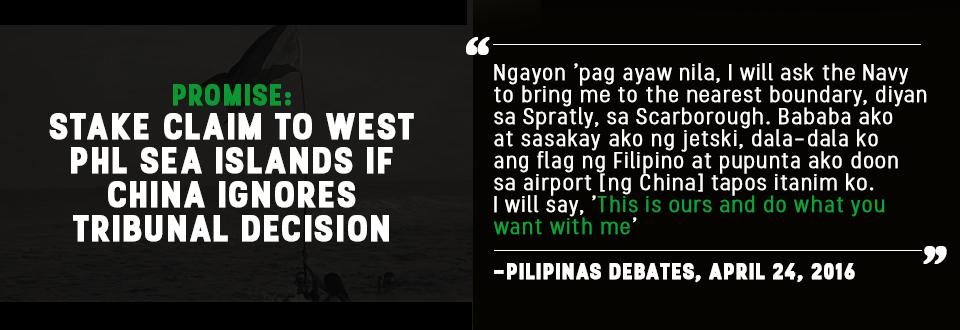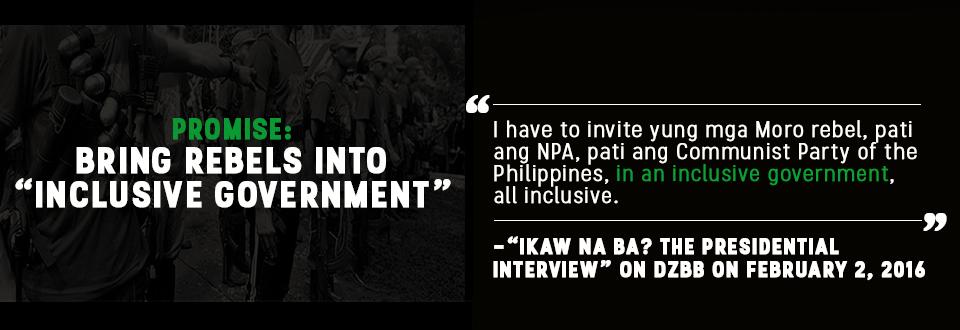Duterte’s promises and his first year in office: National security
Rodrigo Duterte's declaration that he would ride a jet ski to plant a flag on disputed territories in the West Philippine Sea may have been hyperbole, as he later claimed, but many took him at his word.
Even during the presidential campaign, however, Duterte already stressed he would not go to war if China refused to accept or honor the Permanent Court of Arbitration's ruling on the South China Sea. "[I]f they want to...you know, eh, matagal ko nang ambisyon 'yan na maging hero rin ako," he said to laughter at the PiliPinas debates. "Pag pinatay nila ako doon, bahala na kayong umiyak dito sa Pilipinas."
As president, however, Duterte has enjoyed more cordial relations with China. Below are some of the promises Duterte made regarding the West Philippine Sea and other issues of national security.

With China refusing to recognize the Hague tribunal's ruling, the Duterte administration pushed to improve ties with Beijing. The President traveled to China on October 18 to 21, 2016 for a state visit.
A few days before his trip, Duterte said the jet ski statement was just hyperbole.
During his meeting Chinese President Xi Jinping, Duterte raised the issue of the Filipinos’ traditional fishing rights in the Scarborough and Panatag Shoal.
After the Beijing visit, Filipino fishermen were able to fish at the shoal without being harassed by China, except for a few instances.
True to his word during the campaign, Duterte pushed for the Philippines and China to have a bilateral consultation mechanism to peacefully resolve maritime disputes. The mechanism was launched in May.
When Supreme Court Senior Associate Justice Antonio Carpio questioned Duterte’s strategy towards China and The Hague ruling, the President said that Xi raised the possibility of a conflict if Duterte insists the disputed area belongs to the Philippines.
He recalled his conversation with the Chinese head of state: "'That is ours. I will dig oil there.' And not in so many words, not really war but ‘yung diplomatic. And President Xi Jinping is very good at that. Ganoon na, ‘Huwag kasi kaibigan na tayo ngayon.’ In the raw translation, ‘Eh bakit lugawin mo pa? ‘Pag pumasok ka diyan magka-giyera pa tayo. There will be trouble.' If you are an idiotic naïve, anong sabihin trouble? Eh ‘di trouble, ‘di giyera."
As the chairman of the ASEAN for 2017, Duterte on June 4, 2017 reiterated that the leaders of the Southeast Asian countries wanted to finalize the Code of the Conduct of the Seas with China.
"The last time that we talked with President Xi Jinping, one of the issues that I raised was could we have the Code of Conduct of the Seas before the ASEAN or during the ASEAN proper itself?... I think that everybody just want to follow the resolution of one conflict in a peaceful way and the observance of the rule of law," he said.
Meanwhile, former House Speaker Jose de Venecia Jr., who was appointed as special envoy for Asia-Pacific Economic Cooperation (APEC), has been calling for a joint exploration in the disputed waters to resolve maritime row, echoing Duterte’s early campaign statements.

For decades the government and the communists' political arm, the National Democratic Front of the Philippines, have held peace negotiations that have resulted in little or no success.
The Duterte administration revived the peace talks in August 2016, but the road to peace has not been a smooth one.
In his first State of the Nation Address, Duterte declared a unilateral ceasefire with CPP/NPA/NDF, but the NPA attacked CAFGU militiamen two days later in what they said was an act of self-defense.
Duterte called off the ceasefire, putting a crimp in relations with communist leader Jose Maria Sison, with the two calling each other "arrogant."
Ahead of the resumption of talks in Oslo, however, both sides declared their own ceasefires—an indefinite one on the government's side.
Three rounds of peace talks occurred in Oslo and Rome from August 2016 to January 2017 before Duterte cancelled the talks in February, after three soldiers were killed in Malaybalay, Bukidnon by the NPA.
Last May, the government panel withdrew from the fifth round of negotiations , now held in the Netherlands, as the NDFP called on the NPA to intensify attacks against the government after Mindanao was placed under martial law.
Just last week, the NPA expressed doubts on the future of peace negotiations following the recent offensives by the rebels, particularly a raid in a town in Iloilo.

The military has intensified its operations against the local bandits, who have been involved in terror attacks and kidnapping incidents in the southern part of the Philippines.
In August 2016, the Abu Sayyaf beheaded hostage Patrick Almodovar, while at least 30 on its side were believed to have been killed in clashes with the military. The next month, a deadly blast in Davao was attributed to the terror group.
Earlier this year, Duterte set a six-month deadline for government forces to end local terror groups, including the Abu Sayyaf.
In May, however, an attack was launched on Marawi City by the Maute group as troops attempted to arrest Abu Sayyaf leader Isnilon Hapilon, believed to be the "top honcho" of the Islamic State in the Philippines. The conflict continues to rage in the war-torn city and Hapilon is still at large.
— Trisha Macas, Marlly Rome C. Bondoc and Anna Felicia Bajo/BM, GMA News



